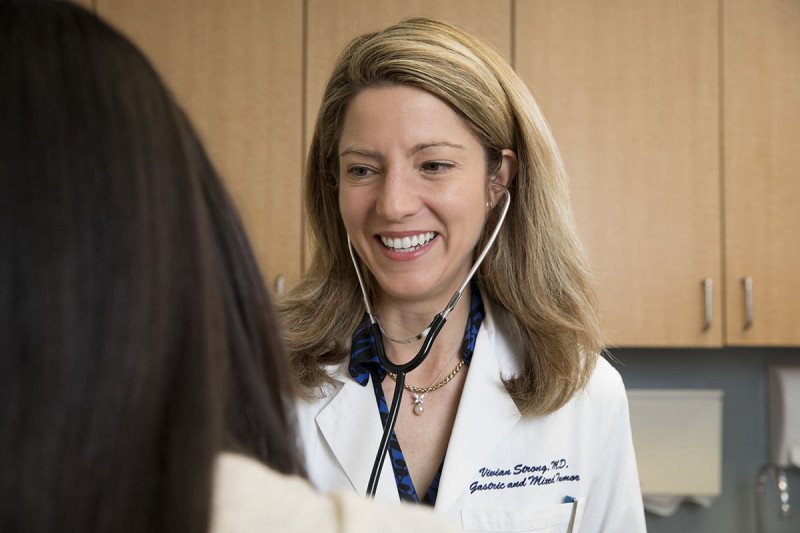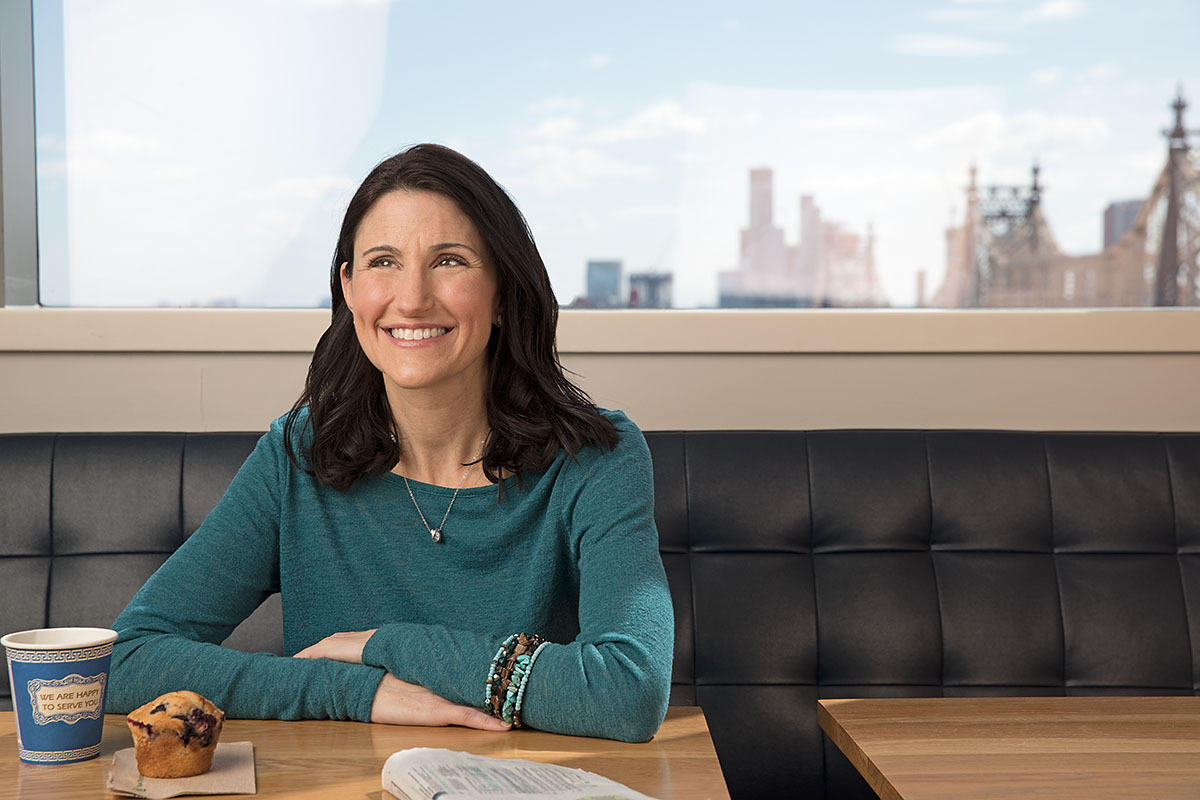
Surgeon Vivian Strong says preventive stomach removal has a very high success rate and patients adjust well afterward.
Update: On September 30, 2020, an MSK team led by Dr. Strong published results of a study in JAMA Surgery suggesting that stomach removal could be appropriate for people with CDH1 mutations and a family history of gastric cancer. The study, which involved 101 patients, also showed stomach removal could be appropriate with CDH1 mutations but without a family history of gastric cancer.
Original post: In 2014, Marguerite Smith learned that she had about a 70% risk of developing an aggressive type of stomach cancer called hereditary diffuse gastric cancer due to a mutation in the CHD1 gene. With her doctor, Marguerite made a crucial decision to have her entire stomach removed — called a total gastrectomy — to eliminate that risk. Today, like many others who undergo this surgery, Marguerite has no sign of cancer in her body and has adjusted well to life without a stomach.
For Marguerite, the first inkling that she might be at risk came in 2013, when her younger brother was diagnosed with stage IV stomach cancer at the age of 30. His doctors suspected it might have a hereditary cause, so MSK’s Clinical Genetics Service tested him for the CDH1 mutation. Their suspicions were confirmed — he was positive for the mutation — and Marguerite, who had just turned 40, was tested soon after. She, too, tested positive.
A biopsy done at MSK showed she was already positive for the earliest stage of hereditary diffuse gastric cancer, so Marguerite consulted with MSK surgeon Vivian Strong about the ins and outs of a prophylactic (preventive) total gastrectomy. “She explained the whole process, how she does it robotically using very small incisions and has a very high success rate,” Marguerite says. “She really made me feel safe with the decision, and my husband and I knew we had found the right person to do the surgery.”
In June 2014, Dr. Strong removed Marguerite’s entire stomach with robotic surgery and connected her esophagus to her small intestine. She also removed more than 30 lymph nodes for examination to confirm that the cancer had not begun to spread.
Resuming Normal Activity
“There’s a widespread misconception that you need a stomach to live, when you actually don’t,” says Dr. Strong. “This operation, in which our surgeons have become highly specialized, can eliminate a major cancer threat for this group of people with the mutation.”
Following surgery, Marguerite spent about five days recovering in Memorial Hospital and was able to resume eating small amounts within a few days.

Marguerite Smith
“Amazingly, any discomfort and pain was really just in my abdominal muscles, which got better as each day passed,” she says. “I was shocked, because I really expected with that kind of surgery to be feeling pain from inside, just from everything that was changed around. But I was back to work in about eight weeks.”
Years later, Marguerite says the surgery has not significantly interfered with her eating habits. Most people adjust to eating smaller amounts at first, Dr. Strong says, and should take small bites and chew thoroughly. They also learn through trial and error which foods they can tolerate and which might cause problems.
“I was already someone who ate small portions spaced throughout the day, so I would say that two years out I’m mostly eating the same as before the surgery,” she says. “Before, eating two pieces of pizza [in] one sitting was a lot for me, and I can still do that now.”
Today, Marguerite has no signs of cancer in her body. During the first year after surgery, she had CT scans every three months and now has them annually. All have shown no sign of disease. As she lives in Suffolk County on Long Island, she is able to receive some of this follow-up monitoring at Memorial Sloan Kettering Commack.
Marguerite’s successful surgery and recovery is not uncommon.
A recent study led by Dr. Strong and published in the Annals of Surgery confirmed the effectiveness of total gastrectomy to eliminate the risk of stomach cancer. Among the 20 patients on the study with the CDH1 mutation who had total gastrectomy — patients like Marguerite — 40% had “as expected” quality of life after surgery and 45% had “better than expected” quality of life.
“This is the first study anyone has done to look at outcomes in these patients, and it shows that this lifesaving procedure need not cause a permanent disruption in their lives,” Dr. Strong says.
Alerted to Risk
Marguerite is grateful to have learned about the genetic test and about the positive outcome of her surgery but distressed that these benefits were a result of her brother’s illness. He passed away in the fall of 2015.
Dr. Strong says it’s common for people to seek genetic testing after being alerted to their risk for hereditary stomach cancer when a fairly young relative is diagnosed. The test for the CDH1 mutation is especially critical because hereditary diffuse gastric cancer is nearly impossible to detect at an early stage.
“It starts with a tiny spot of cancer cells that’s very hard to see and then immediately burrows deep into the wall of the stomach,” Dr. Strong says. “A gastroenterologist studying the stomach surface through an endoscope will think it looks normal.”
After surgery, evidence is often found that the cancer had already begun: MSK pathologists always examine the stomach tissue for early signs of cancer — and they find it 97% of the time.
“It’s an interesting perspective for both the patient and the doctor, in that it’s an unusual case where you kind of want to find something,” Dr. Strong says. “In most cases, we do, and it often makes the patient feel better about having the operation. But even if nothing is found, the high risk that cancer would eventually occur still applies.”
She adds that patients treated at MSK benefit greatly from well-experienced surgeons who began doing prophylactic gastrectomies in 2005.
“We see more stomach cancer here than any other hospital in the country, and no other center does these robotic procedures in such high volume,” Dr. Strong says.
She hopes the Annals of Surgery study will help doctors get a better idea of who should actually have the procedure. There may be people with the CDH1 mutation who aren’t at especially high risk, or who are old enough — older than 65 or 70 — that the procedure may not offer enough benefit. But she’s gratified that more clinicians are aware of the CDH1 mutation so more people can benefit.
“For these people, it’s been a dramatic change,” she says. “They come in with tragic stories: ‘My mother died when I was eight, my identical twin sister died a year later, and I have the mutation.’ You tell them, ‘The bad news is you lose your stomach. The good news is you will not die of stomach cancer.’”


